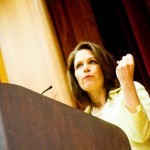
by John Bloom | Jun 29, 2011
 The Des Moines Register’s Editorial on Monday, June 27, 2011 was titled “Steep budget cuts now could harm economyâ€.
The Des Moines Register’s Editorial on Monday, June 27, 2011 was titled “Steep budget cuts now could harm economyâ€.
Summary – The Register’s Editorial group pointed us once again to the “nonpartisan fiscal agencyâ€, the Congressional Budget Office (CBO).  They quoted the CBO’s “dire warning about unsustainable federal deficitsâ€, but cautioned that the report also “warned that steep cuts right now could make the nation’s fiscal condition even worse by kicking the legs out from under the economyâ€.  Also on June 27th, The Wall Street Journal’s front page led off with an article titled “Debt Hamstrings Recoveryâ€[1].  The WSJ’s Tom Lauricella notes “Around the globe, the inability of governments and households to reduce their debt continues to cast a shadow over Western economiesâ€â€¦â€Unlike the aftermath of typical recessions, simply lowering interest rates hasn’t been enough to get growth back on track…Quite the opposite has been the case… The lowered cost of borrowing has enabled individuals and government to delay taking measures to change the way they spend and save.â€
Comment on the DSM Register’s Selective Reporting – I have noticed a pattern of inconsistency in the DSM Register’s and WSJ’s reporting.  Many featured articles in the WSJ, arguably a far more competent source of economic analysis than Gannett’s network, are minimized or never presented in the DSM Register. In addition to the “Debt Hamstring†analysis, another recent example would be the study released by management consultant McKinsey. They surveyed 1,300 companies and found that one third (1/3) of them will “definitely†or “probably†stop offering health insurance after 2014.  Since candidate Obama guaranteed us that we would be able to keep our current insurance, this seems like a worthwhile piece of news. If the DSM Register featured it, I must have overlooked it. I wonder if the nonpartisan CBO is aware of it?
Analysis of the “Spend Now, Save Later Strategyâ€Â - If we were in the position of China, over $3 trillion in foreign exchange reserves[2], I would not have a big issue with spending some of those reserves to shore up a short term slump in the economy.  However Government debt as a % of GDP has increased from 30% in the early 2000’s to 35% by the end of the Bush presidency (increasing under both Republican and Democrat congresses). During the Pelosi-Reid-Obama era, that % is now approaching 60%.  Meanwhile consumer debt and mortgage debt has more than doubled since 2000 (from $10 to about $20 trillion combined). Given the state of our debt, any increase in interest rates (almost a certainty the way the Fed has increased the money supply) will quickly multiply the consequences of our excessive debt.   For my entire adult life I have heard politicians claim that we will “save later, when the economy is strongerâ€. That day never comes. The Clinton-Gingrich era budgets were a nice anomaly but were not based on sustainable structural changes. The Register is wrong. We must cut government spending substantially and quickly.
[1] WSJ 27 June 2011, Debt Hamstrings Recovery
[2] WSJ, 26 June 2011, “China Pledges Continued Support for European Debtâ€



![FUD 101]()
by Brian Nygaard | Jun 29, 2011
 It is now official. The semester is over, and the grades have been posted. Not only has the Obama Administration flunked ECON 101; they have now also summarily flunked FUD 101.
It is now official. The semester is over, and the grades have been posted. Not only has the Obama Administration flunked ECON 101; they have now also summarily flunked FUD 101.
The Wall Street Journal, in an editorial entitled ‘Bumps in the Road,†quoted the chief White House economist Austin Goolsbee as saying “there are always bumps on the road to recovery, but the overall trajectory of the economy has improved dramatically over the last two years.†The WSJ goes on to conclude that “The real ‘bumps on the road’ to recovery are these policies and the larger climate of hostility towards job creators that still prevails in Washington.†They compare the massively positive trajectory of the post-recession Reagan administration recovery with the current economic situation. The differences could not be more starkly contradictory.
To listen to the liberal pundits is to conclude that the Obama administration is the victim of past failures and that it is now doing everything it can to save the sinking ship. No one argues that the economy he inherited was other than a mess. The issue is rather that he has done everything in his power to take a very bad situation…and make it infinitely worse. Much of life is “infinitely projectable but for time.†It was infinitely projectable that we would be headed into a downward economic trajectory, contrary to Mr. Goolsbee’s disputations. The only question was how long it would take for the system to crumble under the stress. President Reagan did everything he could to sponsor job creation. President Obama has been absolutely masterful in destroying any hope of a reinvigorated jobs machine.
After the mid-term elections, it was generally thought that a collective sanity was about to return to our political and economic lives. The thinking was that the Democrats had done all the damage they could possibly do, and that they would turn their forward focus towards getting re-elected. The survival instinct would seemingly have indicated that they needed to take their foot off the throat of the economy. But, lo, many of us underestimated their focus on their ideology. Apparently, the beatings will continue until morale improves.
The reckless pursuit of egalitarian ends represents not only a violation of economic growth principles; it also represents a violation of basic human principles. What is now being experienced in the economy, and the pathetic (or completely non-existent) recovery, does not require any understanding of global macro economics. But it does require a base level understanding of the curriculum of FUD 101. Business people understand FUD. The Obama administration, it has now been made clear, simply do not.
FUD (the acronym used to describe any environment of FEAR, UNCERTAINTY and DOUBT), is the mortal enemy of all progress. When these characteristics exist in any human system, people do “what people do†when confronted with FUD…they do absolutely nothing. They keep their heads down. They keep their powder dry. They hold their cards close. They do not “invest in their futures.†The clichés go on indefinitely. The bane of any human existence, personal or institutionally collective, is the presence of unpredictable outcomes. And the Obama administration has created an environment where no one can predict anything with any level of certainty. The capitalist system in this country is under attack, and no one can predict where the next bombing raid might take place. FUD reigns supreme.
Had anyone in the Obama administration ever managed anything outside of the political arena, they would better see the magnitude of the damage they are creating. They would also not be surprised by what is now happening in the private sector. The President himself would not be attempting to use the bully pulpit to “shame†business leaders into hiring additional staff…as their patriotic duty. They would also not be continuing to blame the “situation they inherited†for the current situation. The path to economic recovery was well-documented thirty years ago by the Reagan/Laffer economic team. This same path has been thoroughly documented around the globe in the last several hundred years.  It is really too bad President Obama decided instead to make up his own “experimentally progressive†economic agenda.
All he really needed to do was take just one semester of FUD 101.



![FUD 101]()
by Steven Waechter | Jun 21, 2011
 Around the corner from my former apartment in Newton was a house that was taken in foreclosure. The “For Sale†sign had been there for a very long time, the lawn wasn’t mowed regularly and the shrubs had died in the winter but hadn’t been removed.
Around the corner from my former apartment in Newton was a house that was taken in foreclosure. The “For Sale†sign had been there for a very long time, the lawn wasn’t mowed regularly and the shrubs had died in the winter but hadn’t been removed.
Walk around your own neighborhood and see how many houses are for sale. Sometimes the sign openly states that it is bank-owned, other times you might have to search on the county assessors website. There are plenty of bank-owned houses in Iowa; there are many, many more in California, Nevada, Michigan and Illinois.
The point is this: With such a large supply of bank-owned houses, of course houses will continue to fall in price. When a store has excess inventory, they need to have a discount sale to get rid of it, the same is true for houses, and banks are taking more houses every day.
Banks live and die by their balance sheets. If a bank has the cash to keep these houses in their possession, hoping that the prices will stabilize and that they can sell at prices that allow the banks to recover the unpaid mortgage, then they will keep on trying to sell houses in the usual retail market. As soon as a bank runs short of cash, or can no longer carry the costs of the property taxes and the maintenance for all these houses, they will sell their houses at fire-sale prices, probably even at auction. No reserve bids, the highest price gets the house free and clear.
This should have happened back in 2009-2010. Banks, short on cash and overloaded on houses and notes for houses, would have had to dump them for whatever they could get. This would have caused a sharp decline in housing prices, but as the houses were sold and put back to work – the job of a house is to shelter people – the supply would have been worked through and housing prices would have recovered and stabilized in relatively short order.
And then came the TARP bailout. The federal government gave billions of dollars in checks to the banks, giving them a “capital injection†– putting cash on their balance sheets – hoping that the banks would lend it out. They didn’t. They kept it in cash, and were able to carry thousands of foreclosed homes on their books through the crunch of 2009-2010.
Instead of a flash drop followed by a recovery, the American homeowner was “spared†a deep but short fall in home prices and instead have been subjected to this long, slow death march of declining home equity. The decline we got may have been slower, but it will be longer, guaranteeing that more private home owners will be forced – by a bad economy, relocation, or retirement – to try and sell their most expensive asset in a market that is still actively falling. As for potential buyers, the odds are that the longer they hold off making a purchase, the better deal they will get.
If we had skipped TARP, then this glut of houses would have been worked through by now, sold at auction either by the banks or by the bankruptcy trustees of the banks that didn’t get the message of the markets.
Politicians that supported TARP are still finding ways to rationalize it. “We needed to preserve the financial system.†“We needed to prevent chaos,†and on, and on, and on. All they achieved was to prevent real bargains and guarantee continued oversupply. They need to be held accountable for their support of that pathetic misstep passed under the cover of hysterics.
style=’clear:both’>
![FUD 101]()
by | Jun 15, 2011
 Seven Republican Presidential contenders took the stage in New Hampshire Monday night in attempts to sway the primary electorate in their favor. Though the performances of all were respectable, their level of success in making their cases was varied. The following is a recap of what went down, who went up, who maintained, and what surely raised some eyebrows.
Seven Republican Presidential contenders took the stage in New Hampshire Monday night in attempts to sway the primary electorate in their favor. Though the performances of all were respectable, their level of success in making their cases was varied. The following is a recap of what went down, who went up, who maintained, and what surely raised some eyebrows.
The Format and The Field
In general CNN did a nice job making the debate informative and substantive. What did not work was attempting to do away with the traditional bell or buzzer to limit each candidates response time and giving them only 30 seconds to answer the questions. Thirty seconds is simply not enough time for anyone to explain their position on complex issues, especially when the questions are multi-faceted. The result of this was moderator John King, who I very much respect, constantly trying to interrupt the participant’s responses, some of these interruptions were justified, most were not, and all were distracting.
In terms of the candidates, it was stunning both how cordial they were to each other and how little difference existed between them on the vast majority of their positions. Anyone who closely followed the 2008 primary debates could instantly tell that the Republican Party has shifted further to the right than it was four years ago. To Conservatives this is not only a positive on substance, but is also comforting as it guarantees that the 2012 election will be a clear ideological choice for the rest of the Country. This is something that you could not necessarily say about McCain vs. Obama in 2008 as, though it is hard to believe now, Obama actually ran as a “unifying†moderate Democrat (no chance he gets away with that this time!).
Eyebrow Raisers
Here is a snap-shot of both the good and bad headlines that were made and the things said that could have a lasting impact on the race.
1) Though provoked, Tim Pawlenty inexplicably chose not to attack Romney on health care and Rick Santorum took a pass at wounding Romney on his abortion flip-flop.
2) Michelle Bachmann replaced answering the first question asked of her with the unexpected announcement that she is officially running.
3) Bachmann played into the potential “extremist†label by implying that she believes a pregnant woman whose life is in danger, has been impregnated by a family member, or is the victim of rape should be legally required to give birth to the child. I realize that many hard-line Republicans may agree with this and that often these exceptions can be a ruse to justify an abortion, but the point is that, by and large, this will be controversial to the general electorate.
4) Even after months of running for president Herman Cain still refuses to provide any level of specificity regarding foreign policy, even after being widely criticized for his failure to do so in the first debate.
5) Newt Gingrich “re-back tracked†on his statement that Paul Ryan’s Medicare reform proposal is “right wing engineeringâ€. After saying this initially, then the following day saying his comments were “unfortunateâ€, last night he dug in and defended his original words (though he gave a fairly effective, all be it nuanced, explanation).
6) Ron Paul, in responding to what he would do regarding our current troop deployment, gave probably the best answer of the night by saying “I wouldn’t wait for my General’s; I’m the Commander In Chief. I make the decisions, I tell the Generals what to do, and I’d bring them home as quickly as possible.†This was great in that it shattered the multi-administration practice of using the Generals and there recommendations as an “excuse†to avoiding making the hard decision of ending a war. As soon as a General says, “I think we should lose this war now and leave immediately†I will characterize this practice differently.
7) Paul emphatically said that as president he would not authorize drone attacks on Al Qaeda in Yemen or in Pakistan (and presumably anywhere else).
8) Paul also said that hospitals should not be required to give illegal aliens (in this example a 5 year old child) emergency room medical care. Now even the most passionate Ron Paul supporters have to realize that, regardless of what merit one might think it has in theory, you simply can’t say something like this in presidential politics and expect to win anything.
The Winners, The Maintainers, and The Losers
This debate saw three candidates gain a great deal; two do enough to keep their position in the field unchanged; and two who likely saw the status they have worked hard to build up diminished. The following categorizations are all based on individual expectations coming in and what they needed to do to boost their place in the pack.
The Winners
Michelle Bachmann—It’s hard to imagine her first appearance in the race, and on the National stage, going much better than it did. It was not only obvious that she belonged in the race, but that she is very near the top tier already. She confidently displayed her firm grasp on the issues, effectively alluded to her large and ongoing role in the fights on Capitol Hill, and emoted aggressiveness in going after Obama—something that Republicans are starving for. She said she would not rest until Obamacare is repealed and would spur job creation by bringing down tax rates substantially and reforming/repealing the EPA. You know it was a good night for her when the only indecisiveness she showed was on the question of who she preferred between Elvis and Johnny Cash, her answer…both.
Newt Gingrich—Anyone who thought Newt was going away anytime soon must now consider that opinion a gross overreaction. Of all the candidates on the stage it was clear he was the most steeped in history, policy, and that he was the most natural debater. The immediate post-debate reaction from the CNN crew tried to make his statement that he would demand anyone in his cabinet be committed to the country and the Constitution akin to McCarthy-ism. That is complete rubbish. He called the Obama administration a “destructive forceâ€, said he would repeal the Dodd-Frank financial reform bill as well as defund the National Labor Relations Board, and would quickly work to repeal Obamacare. Speaking of Obamacare, he was the only candidate to acknowledge the importance of a Senate majority in achieving repeal. He also said that he would re-assess our whole involvement in the Middle East and would bring our troops home as soon as possible (pursuant to their safety).
Rick Santorum—Anyone who sleeps on this guy’s chances is making a huge mistake. His two debate performances have been impressive and even if he is not able to claim victory, he has VP shortlist written all over him. Though you are not hearing a lot of buzz about him he actually gave the evenings most decisive and specific answers, and once again proved that this stage is not too big for him. He fully embraced both Paul Ryan and the Tea Party, said he would cut the capital gains tax rate in half (after 5 years of 0% capital gains), and had a well thought out and specific plan to phase out ethanol. He very successfully made the case that Obama would begin cutting Medicare in 2014, while saying his approach would be to turn the whole system into something very similar to Medicare Plan-D. Overall he delivers clean, forceful sentences and already has a large natural base with the religious right (which either Romney or Huntsman would covet in a running mate should they win the nomination).
The Maintainers
Mitt Romney—Coming in as the perceived front-runner, he likely did enough to maintain this position. He made no mistakes while intentionally breaking no new policy ground. On all major issues he spoke in the most fundamental terms of all the candidates, likely foreshadowing a strategy of staying broad-viewed and specific free in the races early stage. The biggest pluses for him on this night were that he gave the most coherent and convincing defense of Romneycare to date, and was not subjected to repeated attacks from the rest of the field, as was expected.
Ron Paul—Paul gave his standard strong performance, which unfortunately also included his usual hammering on a handful of his positions that make him an unrealistic general election candidate. He is so right about nearly everything in the domestic realm, but no Republican (or Democrat) will ever win the presidency by refusing to pro-actively attack Al-Qaeda with drones. The only way this position would be feasible is if you took the drones off the table while simultaneously offering an alternative strategy to protect us from the threat of terrorism. There is no doubt that the American people would support ending all our current engagements in the Middle East, but just implying that this alone would end the risk of being attacked is never going to fly. It continued to be obvious just how much the Republican Party has gravitated his way over the last four years by how many times the other candidates referenced both his view points and his answers (something that never happened in the 2008 primary debates).
Not only did many of the candidates say, as Paul has forever, that it is time to quickly end all three wars, but I have never heard “states’ rights†mentioned so many times in a debate before…and for that we thank you Ron. If the election only concerned domestic affairs I think it would be shocking how well he would do.
The Losers
Tim Pawlenty – For a candidate that so many expect to break through any day now—the wait continues. Though his performance was solid he really needed to do more, and he had the chances to. Not only did he inexplicably fail to challenge Romney over health care, he also failed to capitalize on being the only candidate so far to have released a specific economic growth plan, which he did last week. Talking his plan up should have been the first thing on his agenda (and the second…and the third). He absolutely could have drawn the distinction between himself and the rest of the field that he desperately needs by saying “I am the only candidate on this stage that has a concrete plan to turn the economy around, the rest of these people are only offering wordsâ€. That being said, he did give strong answers on fair trade, right to work, and was the only one to mention the importance of appointing Conservative justices to the courts (which he had a good record of doing in Minnesota).
Herman Cain—While he was able to shine with the lower-tier candidates in the first debate, Cain struggled to stand out amongst the heavier hitters. What hurts him the most is that while others are able to point to decisions they have made, votes they have taken, and legislation that they have championed, he is not able to do the same. Not being able to cast himself in those roles creates a perception, probably an unfair one, that he is removed from the fight. He could counter this by bringing to the debate specific, innovative, and well thought out solutions, but as of yet these are in short supply. Driving this point home was the fact that, despite being the former CEO of a restaurant chain, he did not even have a specific opinion on the FDA—saying in response to a question that “maybe†they need to be reformed or stream-lined. There is a lot to like about him, and he did have some good moments, but how he thinks, after months of running for president, that he can refuse to give specific foreign policy opinions is beyond me. If anyone has the personality to make some populist noise it is him, but more than any other candidate he needs to be offering unique, brilliant, and very specific proposals to stand out. If he does this he will elevate his status, until then he will remain buried in the pack.
Photo courtesy of TEApublican.



![FUD 101]()
by DJ Durant | Jun 11, 2011
 Yes, the chickens are coming home to roost. All of a sudden, the man who had all the answers three years ago has none. He was calm, cool and collected. He convinced the American citizenry that he could solve all of the country’s problems, and that it was critical that we abandon the “failed policies of the last eight yearsâ€.
Yes, the chickens are coming home to roost. All of a sudden, the man who had all the answers three years ago has none. He was calm, cool and collected. He convinced the American citizenry that he could solve all of the country’s problems, and that it was critical that we abandon the “failed policies of the last eight yearsâ€.
We are 17 months away from the next presidential election and the economy is definitely slowing. Aggregate demand for goods and services is weakening. And unless President Obama changes course on legislation enacted in the last two years, we are likely to enter yet another recession. He won’t, though, and it will prove to be his undoing.
Conservative pundits and Republican presidential candidates are licking their chops. The President’s economic policies are failing. People vote with their wallets.  They know Socialism doesn’t work. Should the economy slow further, it would not surprise me to see other Democrats, sensing opportunity, toy with a Presidential run of their own. Even Anthony Weiner’s troubles aren’t enough to take the spotlight off the economy. (Perhaps the President should appoint Representative Weiner to the post of Social Media czar.)
Unfortunately, we predicted extended economic weakness two years ago. It was easy to spot. We had lived through the Carter Administration. Those who don’t understand history are doomed to repeat it. Over-regulation chokes off economic growth. Businesses and individuals thrive on certainty. The health-care legislation, Dodd-Frank, and impending tax increases (unless the Bush tax cuts are extended further), coupled with out-of-control government spending and astronomical deficits have created the uncertainty. Employment is declining. Unemployment is increasing. The stock market, that predictor of future corporate earnings, is falling. Oil, gas, and other commodity prices are high. Aggregate demand is suffering.
This is Obama’s legacy. He can no longer blame anyone else. And we predicted it.




 The Des Moines Register’s Editorial on Monday, June 27, 2011 was titled “Steep budget cuts now could harm economyâ€.
The Des Moines Register’s Editorial on Monday, June 27, 2011 was titled “Steep budget cuts now could harm economyâ€.


